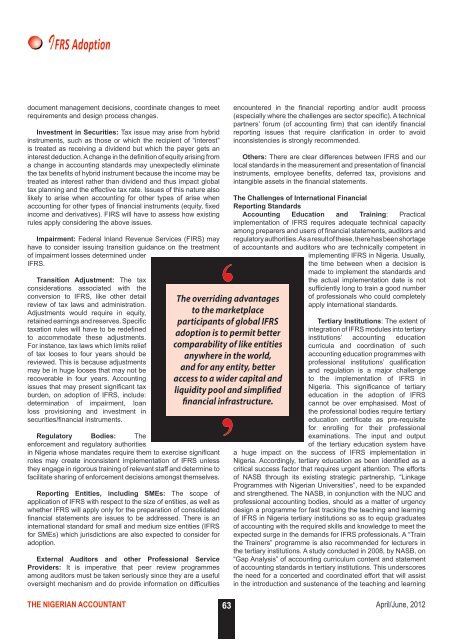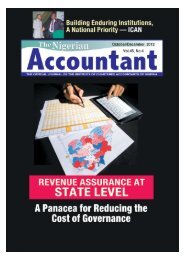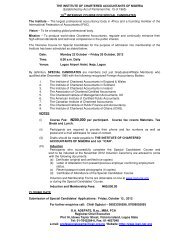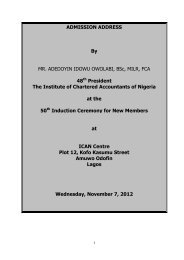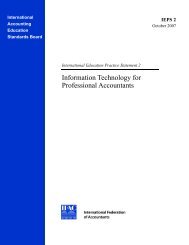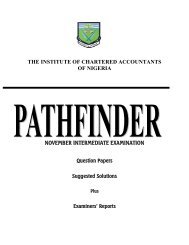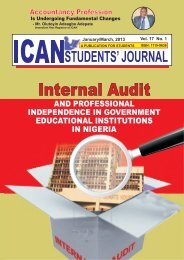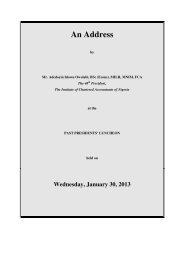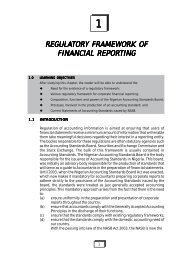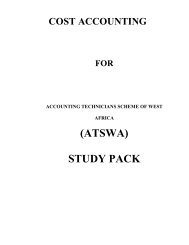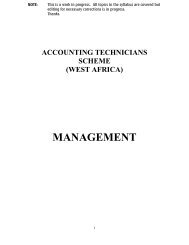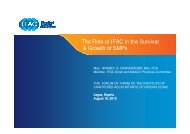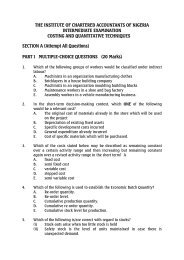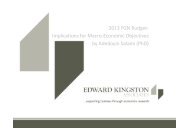The Nigerian Accountant 2012 - The Institute of Chartered ...
The Nigerian Accountant 2012 - The Institute of Chartered ...
The Nigerian Accountant 2012 - The Institute of Chartered ...
Create successful ePaper yourself
Turn your PDF publications into a flip-book with our unique Google optimized e-Paper software.
IFRS Adoption<br />
document management decisions, coordinate changes to meet<br />
requirements and design process changes.<br />
Investment in Securities: Tax issue may arise from hybrid<br />
instruments, such as those or which the recipient <strong>of</strong> “interest”<br />
is treated as receiving a dividend but which the payer gets an<br />
interest deduction. A change in the definition <strong>of</strong> equity arising from<br />
a change in accounting standards may unexpectedly eliminate<br />
the tax benefits <strong>of</strong> hybrid instrument because the income may be<br />
treated as interest rather than dividend and thus impact global<br />
tax planning and the effective tax rate. Issues <strong>of</strong> this nature also<br />
likely to arise when accounting for other types <strong>of</strong> arise when<br />
accounting for other types <strong>of</strong> financial instruments (equity, fixed<br />
income and derivatives). FIRS will have to assess how existing<br />
rules apply considering the above issues.<br />
Impairment: Federal Inland Revenue Services (FIRS) may<br />
have to consider issuing transition guidance on the treatment<br />
<strong>of</strong> impairment losses determined under<br />
IFRS.<br />
Transition Adjustment: <strong>The</strong> tax<br />
considerations associated with the<br />
conversion to IFRS, like other detail<br />
review <strong>of</strong> tax laws and administration.<br />
Adjustments would require in equity,<br />
retained earnings and reserves. Specific<br />
taxation rules will have to be redefined<br />
to accommodate these adjustments.<br />
For instance, tax laws which limits relief<br />
<strong>of</strong> tax looses to four years should be<br />
reviewed. This is because adjustments<br />
may be in huge looses that may not be<br />
recoverable in four years. Accounting<br />
issues that may present significant tax<br />
burden, on adoption <strong>of</strong> IFRS, include:<br />
determination <strong>of</strong> impairment, loan<br />
loss provisioning and investment in<br />
securities/financial instruments.<br />
Regulatory Bodies: <strong>The</strong><br />
enforcement and regulatory authorities<br />
in Nigeria whose mandates require them to exercise significant<br />
roles may create inconsistent implementation <strong>of</strong> IFRS unless<br />
they engage in rigorous training <strong>of</strong> relevant staff and determine to<br />
facilitate sharing <strong>of</strong> enforcement decisions amongst themselves.<br />
Reporting Entities, including SMEs: <strong>The</strong> scope <strong>of</strong><br />
application <strong>of</strong> IFRS with respect to the size <strong>of</strong> entities, as well as<br />
whether IFRS will apply only for the preparation <strong>of</strong> consolidated<br />
financial statements are issues to be addressed. <strong>The</strong>re is an<br />
international standard for small and medium size entities (IFRS<br />
for SMEs) which jurisdictions are also expected to consider for<br />
adoption.<br />
External Auditors and other Pr<strong>of</strong>essional Service<br />
Providers: It is imperative that peer review programmes<br />
among auditors must be taken seriously since they are a useful<br />
oversight mechanism and do provide information on difficulties<br />
‘<br />
<strong>The</strong> overriding advantages<br />
to the marketplace<br />
participants <strong>of</strong> global IFRS<br />
adoption is to permit better<br />
comparability <strong>of</strong> like entities<br />
anywhere in the world,<br />
and for any entity, better<br />
access to a wider capital and<br />
liquidity pool and simplified<br />
financial infrastructure.<br />
‘<br />
encountered in the financial reporting and/or audit process<br />
(especially where the challenges are sector specific). A technical<br />
partners’ forum (<strong>of</strong> accounting firm) that can identify financial<br />
reporting issues that require clarification in order to avoid<br />
inconsistencies is strongly recommended.<br />
Others: <strong>The</strong>re are clear differences between IFRS and our<br />
local standards in the measurement and presentation <strong>of</strong> financial<br />
instruments, employee benefits, deferred tax, provisions and<br />
intangible assets in the financial statements.<br />
<strong>The</strong> Challenges <strong>of</strong> International Financial<br />
Reporting Standards<br />
Accounting Education and Training: Practical<br />
implementation <strong>of</strong> IFRS requires adequate technical capacity<br />
among preparers and users <strong>of</strong> financial statements, auditors and<br />
regulatory authorities. As a result <strong>of</strong> these, there has been shortage<br />
<strong>of</strong> accountants and auditors who are technically competent in<br />
implementing IFRS in Nigeria. Usually,<br />
the time between when a decision is<br />
made to implement the standards and<br />
the actual implementation date is not<br />
sufficiently long to train a good number<br />
<strong>of</strong> pr<strong>of</strong>essionals who could completely<br />
apply international standards.<br />
Tertiary Institutions: <strong>The</strong> extent <strong>of</strong><br />
integration <strong>of</strong> IFRS modules into tertiary<br />
institutions’ accounting education<br />
curricula and coordination <strong>of</strong> such<br />
accounting education programmes with<br />
pr<strong>of</strong>essional institutions’ qualification<br />
and regulation is a major challenge<br />
to the implementation <strong>of</strong> IFRS in<br />
Nigeria. This significance <strong>of</strong> tertiary<br />
education in the adoption <strong>of</strong> IFRS<br />
cannot be over emphasised. Most <strong>of</strong><br />
the pr<strong>of</strong>essional bodies require tertiary<br />
education certificate as pre-requisite<br />
for enrolling for their pr<strong>of</strong>essional<br />
examinations. <strong>The</strong> input and output<br />
<strong>of</strong> the tertiary education system have<br />
a huge impact on the success <strong>of</strong> IFRS implementation in<br />
Nigeria. Accordingly, tertiary education as been identified as a<br />
critical success factor that requires urgent attention. <strong>The</strong> efforts<br />
<strong>of</strong> NASB through its existing strategic partnership, “Linkage<br />
Programmes with <strong>Nigerian</strong> Universities”, need to be expanded<br />
and strengthened. <strong>The</strong> NASB, in conjunction with the NUC and<br />
pr<strong>of</strong>essional accounting bodies, should as a matter <strong>of</strong> urgency<br />
design a programme for fast tracking the teaching and learning<br />
<strong>of</strong> IFRS in Nigeria tertiary institutions so as to equip graduates<br />
<strong>of</strong> accounting with the required skills and knowledge to meet the<br />
expected surge in the demands for IFRS pr<strong>of</strong>essionals. A “Train<br />
the Trainers” programme is also recommended for lecturers in<br />
the tertiary institutions. A study conducted in 2008, by NASB, on<br />
“Gap Analysis” <strong>of</strong> accounting curriculum content and statement<br />
<strong>of</strong> accounting standards in tertiary institutions. This underscores<br />
the need for a concerted and coordinated effort that will assist<br />
in the introduction and sustenance <strong>of</strong> the teaching and learning<br />
THE NIGERIAN ACCOUNTANT 63<br />
April/June, <strong>2012</strong>


